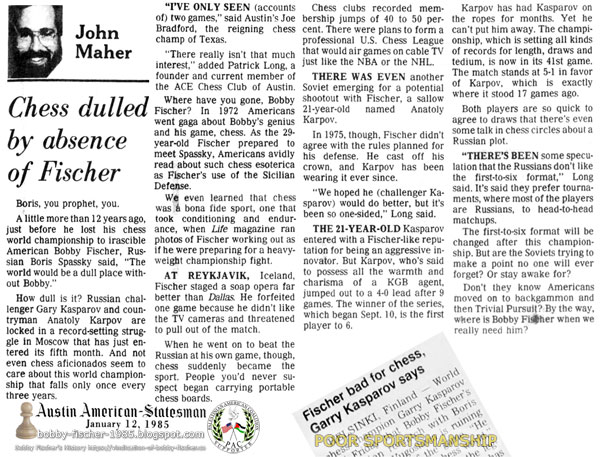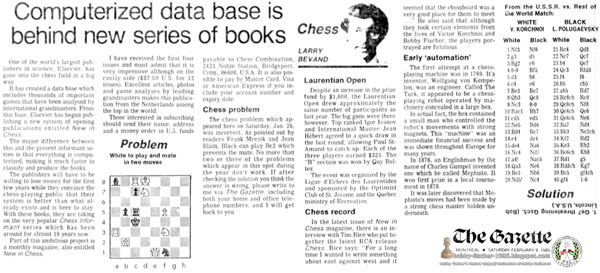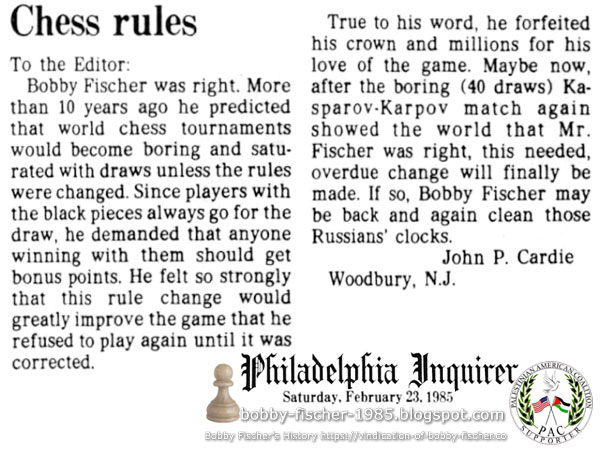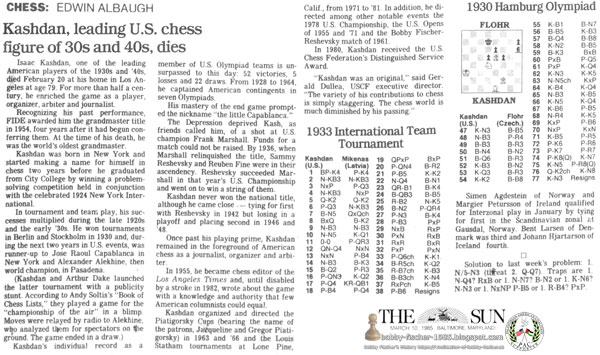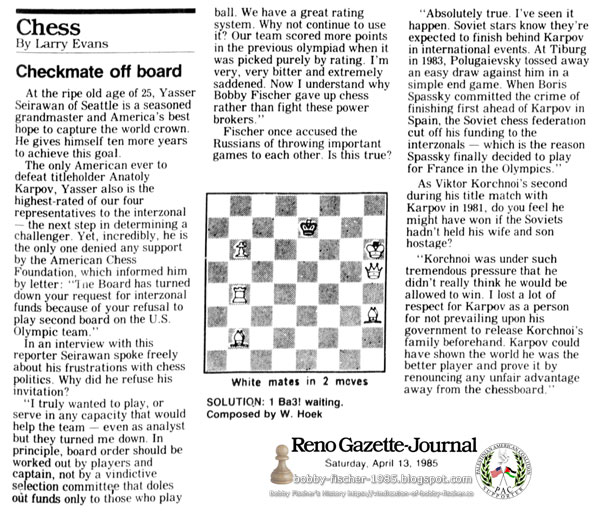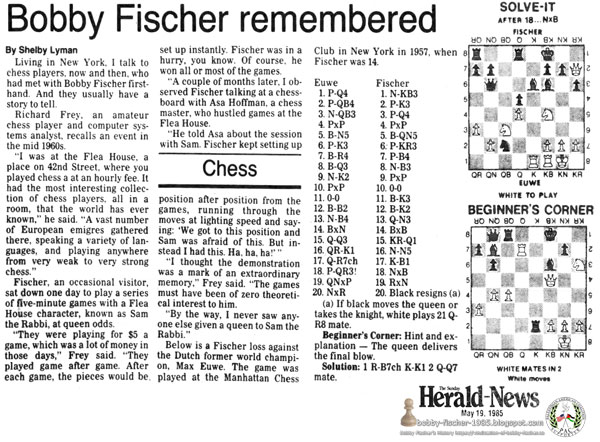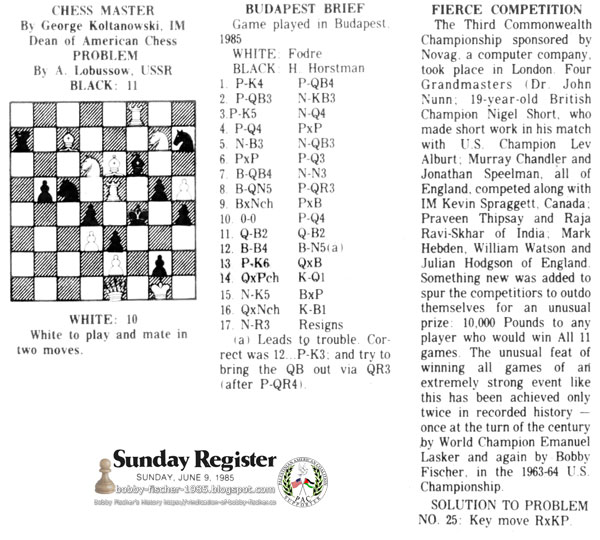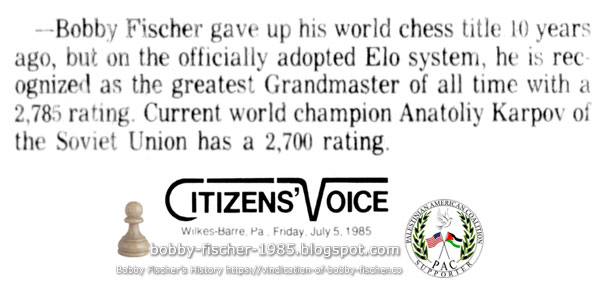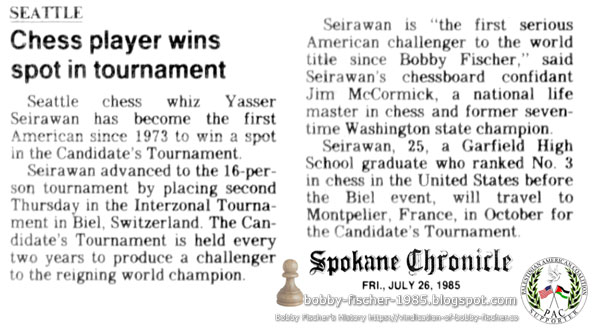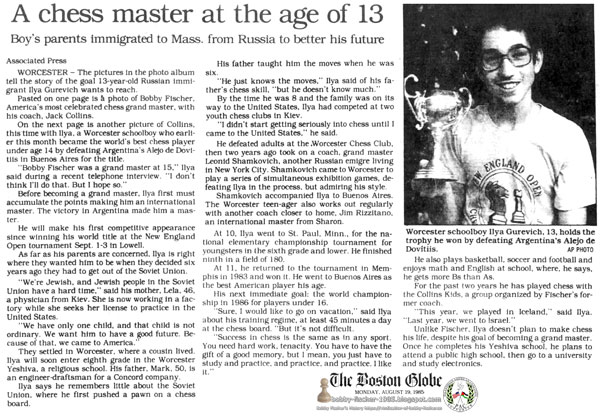Austin American-Statesman Austin, Texas Saturday, January 12, 1985 - Page 27
Chess dulled by absence of Fischer
Boris, you prophet, you.
A little more than 12 years ago, just before he lost his chess world championship to irascible American Bobby Fischer, Russian Boris Spassky said, “The worldd would be a dull place without Bobby.”
How dull is it? Russian challenger Gary Kasparov and countryman Anatoly Karpov are locked in a record-setting struggle in Moscow that has just entered its fifth month. And not even chess aficionados seem to care about this world championship that falls only once every three years.
“I've only seen (accounts of) two games,” said Austin's Joe Bradford, the reigning chess champ of Texas.
“There really isn't that much interest,” added Patrick Long, a founder and current member of the ACE Chess Club of Austin.
Where have you gone, Bobby Fischer? In 1972 Americans went gaga about Bobby's genius and his game, chess. As the 29-year-old Fischer prepared to meet Spassky, Americans avidly read about such chess esoterica as Fischer's use of the Sicilian Defense.
We even learned that chess was a bona fide sport, one that took conditioning and endurance, when Life magazine ran photos of Fischer working out as if he were preparing for a heavy-weight championship fight.
AT REYKJAVIK, Iceland, Fischer staged a soap opera far better than Dallas. He forfeited one game because he didn't like the TV cameras and threatened to pull out of the match.
When he went on to beat the Russian at his own game, though, chess suddenly became the sport. People you'd never suspect began carrying portable chess boards.
Chess clubs recorded membership jumps of 40 to 50 per center. There were plans to form a professional U.S. Chess League that would air games on cable TV just like the NBA or the NHL.
[…]
Both [Soviet] players are so quick to agree to draws that there's even some talk in chess circles about a Russian plot.
[…] The first-to-six format will be changed after this championship. But are the Soviets trying to make a point no one will ever forget? Or stay awake for?
Don't they know Americans moved on to backgammon and then Trivial Pursuit? By the way, where is Bobby Fischer when we really need him?
The Gazette Montreal, Quebec, Quebec, Canada Saturday, February 09, 1985 - Page 25
Chess Record
In the latest issue of New in Chess magazine, there is an interview with Tim Rice who put together the latest RCA release Chess. Rice says: “For a long time I wanted to write something about east against west and it seemed that the chessboard was a very good place for them to meet…” He also said that although they took certain elements from the lives of Victor Korchnoi and Bobby Fischer, the players portrayed are fictitious.
The Philadelphia Inquirer Philadelphia, Pennsylvania Saturday, February 23, 1985 - Page 8
Chess Rules
To the Editor: Bobby Fischer was right. More than 10 years ago he predicted that world chess tournaments would become boring and saturated with draws unless the rules were changed. Since players with the black pieces always go for the draw, he demanded that anyone winning with them should get bonus points. He felt so strongly that this rule change would greatly improve the game that he refused to play again until it was corrected.
True to his word, he forfeited his crown and millions for his love of the game. Maybe now, after the boring (40 draws) Kasparov-Karpov match again showed the world that Mr. Fischer was right, this needed, overdue change will finally be made. If so, Bobby Fischer may be back and again clean those Russians' clocks.
John P. Cardie, Woodbury, N.J.
The Baltimore Sun Baltimore, Maryland Sunday, March 10, 1985 - Page 238
Kashdan, Leading U.S. Chess Figure of 30s and 40s, Dies
“Kashdan organized and directed the Piatigorsky Cups (bearing the name of the patrons, Jacqueline and Gregor Piatigorsky) in 1963 and '66 and the Louis Statham tournaments at Lone Pine, Calif., from 1971 to '81. In addition, he directed among other notable events the 1978 U.S. Championship, the U.S. Opens of 1955 and '71 and the Bobby Fischer-Reshevsky match of 1961.
Reno Gazette-Journal, Reno, Nevada, Saturday, April 13, 1985 - Page 37
Checkmate off board
“In an interview with this reporter Seirawan spoke freely about his frustrations with chess politics. Why did he refuse his invitation?
“I truly wanted to play, or serve in any capacity that would help the team — even as analyst but they turned me down. In principle, board order should be worked out by players and captain, not by a vindictive selection committee that doles out funds only to those who play ball. We have a great rating system. Why not continue to use it? Our team scored more points in the previous olympiad when it was picked purely by rating. I'm very, very bitter and extremely saddened. Now I understand why Bobby Fischer gave up chess rather than fight these power brokers.”
Fischer once accused the Russians of throwing important games to each other. Is this true?
“Absolutely true. I've seen it happen. Soviet stars know they're expected to finish behind Karpov in international events. At Tiburg in 1983, Polugaievsky tossed away an easy draw against him in a simple end game. When Boris Spassky committed the crime of finishing first ahead of Karpov in Spain, the Soviet chess federation cut off his funding to the interzonals — which is the reason Spassky finally decided to play for France in the Olympics.”
The Herald-News Passaic, New Jersey Sunday, May 19, 1985 - Page 68
Bobby Fischer Remembered
“Living in New York, I talk to chess players, now and then, who had met with Bobby Fischer firsthand. And they usually have a story to tell.
Richard Frey, an amateur chess player and computer systems analyst, recalls an event in the mid 1960s.
“I was at the Flea House, a place on 42nd Street, where you played chess at an hourly fee. It had the most interesting collection of chess players, all in a room, that the world has ever known,” he said. “A vast number of European emigres gathered there, speaking a variety of languages, and playing anywhere from very weak to very strong chess.”
Fischer, an occasional visitor, sat down one day to play a series of five-minute games with a Flea House character, known as Sam the Rabbi, at queen odds.
“They were playing for $5 a game, which was a lot of money in those days,” Frey said. “Thy played game after game. After each game, the pieces would be set up instantly. Fischer was in a hurry, you know. Of course, he won all or most of the games.
“A couple of months later, I observed Fischer talking at a chessboard with Asa Hoffman, a chess master, who hustled games at the Flea House.
“He told Asa about the session with Sam. Fischer kept setting up position after position from the games, running through the moves at lightning speed and saying: ‘We got to this position and Sam was afraid of this. But instead I had this. Ha, ha, ha!’”
“I thought the demonstration was a mark of an extraordinary memory,” Frey said. “The games must have been of zero theoretical interest to him.
“By the way, I never saw anyone else given a queen to Sam the Rabbi.”
Below is a Fischer loss against the Dutch former world champion, Max Euwe. The game was played at the Manhattan Chess Club in New York in 1957, when Fischer was 14.
The Daily Register Red Bank, New Jersey Sunday, June 09, 1985 - Page 55
Fierce Competition
The Third Commonwealth Championship sponsored by Novag, a computer company, took place in London. Four Grandmasters (Dr. John Nunn; 19-year-old British Champion Nigel Short, who made short work in his match with U.S. Champion Lev Alburt; Murray Chandler and Jonathan Speelman, all of England, competed along with IM Kevin Spraggett, Canada; Praveen Thipsay and Raja Ravi-Skhar of India; Mark Hebden, William Watson and Julian Hodgson of England. Something new was added to spur the competitors to outdo themselves for an unusual prize: 10,000 Prounds to any player who would win All 11 games. The unusual feat of winning all games of an extremely strong event like this has been achieved only twice in recorded history — once at the turn of the century by World Champion Emanuel Lasker and again by Bobby Fischer, in the 1963-64 U.S. Championship.
Citizens' Voice Wilkes-Barre, Pennsylvania Friday, July 05, 1985 - Page 76
In light of Kasparov's personal bias and error in judgment to say Fischer didn't compete in 1975 because he was “afraid” of Karpov. What was Karpov's Elo rating in 1975?
Bobby Fischer's Elo Rating At Retirement
“Bobby Fischer gave up his world chess title 10 years ago, but on the officially adopted Elo system, he is recognized as the greatest Grandmaster of all time with a 2,785 rating. Current world champion Anatoly Karpov of the Soviet Union has a 2,700 rating…
Spokane Chronicle Spokane, Washington Friday, July 26, 1985 - Page 22
Chess Player Wins Spot in Tournament
“Seattle chess wiz Yasser Seirawan has become the first American since 1973 to win a spot in the Candidate's Tournament.
Seirawan advanced to the 16-person tournament by placing second Thursday in the Interzonal Tournament in Biel, Switzerland. The Candidate's Tournament is held every two years to produce a challenger to the reigning world champion.
Seirawan is “the first serious American challenger to the world title since Bobby Fischer,” said Seirawan's chessboard confidant Jim McCormick, a national life master in chess and former seven-time Washington state champion.
Seirwan, 25, a Garfield High School graduate who ranked No. 3 in chess in the United States before the Biel event, will travel to Montpelier, France, in October for the Candidate's Tournament.
The Boston Globe, Boston, Massachusetts, Monday, August 19, 1985 - Page 2
A Chess Master at the Age of 13
Boy's parents immigrated to Mass. from Russia to better his future
Worcester — The pictures in the photo album tell the story of the goal 13-year-old Russian immigrant Ilya Gurevich wants to reach.
Pasted on one page is a photo of Bobby Fischer, America's most celebrated chess grand master, with his coach, Jack Collins.
Pasted on the next page is another picture of Collins, this time with Ilya, a Worcester schoolboy who earlier this month became the world's best chess player under age 14 by defeating Argentina's Alejo de Dovitiis in Buenos Aires for the title.
“Bobby Fischer was a grand master at 15,” Ilya said during a recent telephone interview. “I don't think I'll do that. But I hope so.”











